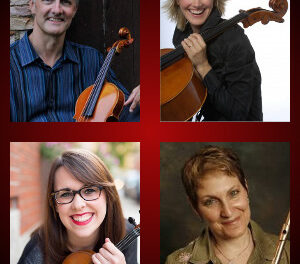Two evocative and expressive works for voice and string quartet, both incorporating the word “edge” in the title, formed the major content of this admirably performed recital in the exquisite Watson Recital Hall on the campus of the University of North Carolina School of the Arts. But for these superficial similarities, the works are stunningly different from each other.
Premiered in 2006 at Chautauqua by Janine Hawley, mezzo-soprano and faculty member at UNCSA, and the Audubon String Quartet, Songs from the Edge, is a dramatic and gripping work in six movements. The first movement is purely instrumental, a long evocation of the composer’s late-lamented sister, who, along with her aunt and grandmother, was felled by breast cancer. The composer, Ella Milch-Sheriff (b.1951), is a well-known Israeli musician whose works have previously been performed by Ms. Hawley, also at Chautauqua. A series of strange coincidences placed the composer in contact with Annette Pashayan, M.D., who had written a set of five poems to illustrate her own struggle with breast cancer. Dr. Pashayan is an anesthesiologist at Wake Forest University Baptist Medical Center and active in musical circles.
An eclectic composer, Ms. Milch-Sheriff makes great use of the colors of the string quartet to invoke the moods of fear, doubt, and suffering portrayed by the Pashayan poems. The third movement, “Chemo and Gould,” tells of the suffering patient’s reliance on the Bach recordings of the late pianist Glenn Gould to find relief and meaning in pain. From the ostinato murmur of slumber, the music rises, Bach-like, to a tremendous climax of the “Deafening beat, Cacophonous shrieking,” followed by a restatement of the opening and relief in “crystal percussion, delicious and light.”
In the fourth movement, “Transplantation,” open fifths set an other-worldly, mysterious tone for the singer’s almost spoken narration (Sprechstimme) of the bone marrow transplant. A lovely cello solo by Brooks Whitehouse (UNCSA faculty) followed by shorter yet sweet solos by violist Christina Placilla (Winston-Salem State University faculty) and Janet Orenstein, a violin virtuoso currently residing in the Triad area, all portrayed the healing of the “Acts” (fifth movement) of friends and loved ones.
Parallel fifths again open the final movement, “Restoration,” defining the falling of snow (as in Act III of La Bohème), which poet Pashayan compares to the restoration of her white blood cell count. The whole work ends in a hymn-like chorale, savoring “tonight’s quiet.” Except for a couple of moments early in the piece where the enthusiasm of the string quartet overpowered the voice of Ms. Hawley, the entire work was sensitively performed, from the rawest to the tenderest of emotions. Janine Hawley has a rich warm voice with excellent diction. She is a delight to hear!
After a year’s study in Paris with his junior, Maurice Ravel, Ralph Vaughan Williams (1872-1958) in 1909 set six poems of A.E. Housman’s A Shropshire Lad to music that is redolent of the harmonies we often associate with French musical impressionism. Tenor Glenn Siebert is a refined and sensitive singer with impeccable diction. The clarity of his vowels and smooth and unforced tone production make abundantly clear why he has had a global career. And the six Vaughan Williams songs fit his voice like a fine kid glove. With Jacqui Carrasco (Wake Forest University faculty) taking over the first violin in the quartet and Allison Gagnon (UNCSA faculty) adding her grand piano to the quartet we had the evening’s largest ensemble on stage; the latter’s shimmering presence was immediately felt in the windy opening to the title song, “On Wenlock Edge.” Ravel’s harmonic influence was felt in the second song and in the bell-like evocation of the fifth song. Despite the occasional Gallicism, these songs are veddy, veddy English, a delight to hear.
The concert began with Three Divertimenti for string quartet (1936) by Benjamin Britten (1913-76), a lightly polytonal March, a lilting syncopated Waltz, and a gigue-like Burlesque. These opened the concert quite pleasantly and provided a light foil for the heavily dramatic Songs from the Edge.
As I listened to the Britten, my mind wandered nostalgically to the time when UNCSA School of Music had a faculty string quartet (Rasoumovsky Quartet), a woodwind quintet (Clarion Wind Quintet), and a chamber orchestra (Piedmont Chamber Orchestra), all allowed to die or to fall apart…. And UNCSA lost the NC Dance Theater to Charlotte and divorced itself from the NC Shakespeare Festival…. On the other hand, kudos to the organizers of this concert to have combined highly qualified musicians from so many diverse sources. Bravi, tutti!











